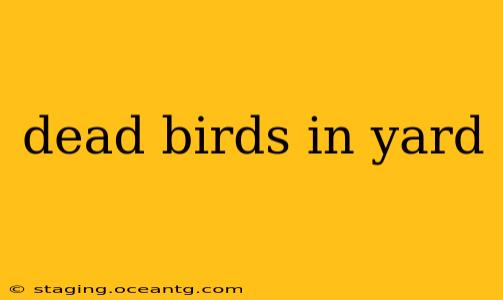Finding a dead bird in your yard can be unsettling. It's a natural part of the circle of life, but it's important to understand the potential causes and take appropriate action. This comprehensive guide will address common concerns and provide practical advice on handling this situation.
Why are there dead birds in my yard?
This is a common question, and the answer isn't always straightforward. Several factors can contribute to a bird's demise, ranging from natural causes to human-induced threats. Let's explore some of the most frequent reasons:
- Predation: Cats, dogs, and other predatory animals are a significant cause of bird mortality. Signs of predation might include feathers scattered around the carcass or visible bite marks.
- Disease: Avian diseases, such as avian influenza (bird flu) or West Nile virus, can cause widespread bird deaths. If you notice multiple dead birds, particularly if they show signs of illness, it's crucial to contact your local wildlife authorities or animal control.
- Starvation or Malnutrition: Lack of access to food, especially during harsh winters or periods of drought, can weaken birds and lead to death.
- Collisions: Birds frequently collide with windows, cars, and other obstacles, resulting in injuries or fatalities.
- Poisoning: Exposure to pesticides, herbicides, or rodenticides can be lethal to birds. If you suspect poisoning, it's crucial to identify the potential source and take steps to prevent further incidents.
- Natural Causes: Old age, sickness, and accidents are also natural causes of bird mortality. A single dead bird without obvious signs of trauma is likely due to a natural cause.
What should I do if I find a dead bird in my yard?
Your response depends on the circumstances. Here's a breakdown of the recommended actions:
-
Single, seemingly healthy bird: If the bird appears healthy, except for being deceased, and there's no apparent cause of death, you can generally dispose of it safely. Wear gloves, place the bird in a sealed plastic bag, and dispose of it in your household trash.
-
Multiple dead birds: Multiple dead birds are cause for concern. Contact your local animal control or wildlife agency immediately. They can investigate the potential cause, such as an outbreak of disease or environmental contamination.
-
Bird exhibiting signs of illness: If the bird shows signs of illness (e.g., lethargy, unusual behavior, discharge from eyes or nose), do not touch it. Again, contact your local animal control or wildlife agency for guidance. They can assess the situation and take appropriate measures.
Is it dangerous to touch a dead bird?
While the risk of contracting a disease from a dead bird is generally low, it's always best to exercise caution. Wear gloves when handling a dead bird and wash your hands thoroughly afterward. Avoid touching your face or eyes while handling the bird.
How do I prevent birds from dying in my yard?
Proactive measures can help minimize the risk of bird deaths in your yard:
- Cat containment: Keep your cats indoors, or use cat containment systems to prevent them from hunting birds.
- Window decals: Apply bird-friendly window decals or stickers to reduce collisions.
- Safe pest control: Use bird-safe pest control methods and avoid using harmful chemicals.
- Provide food and water: Offer a reliable source of food and water, especially during harsh weather conditions.
- Maintain a healthy habitat: Provide natural habitats such as shrubs and trees to shelter birds.
What diseases can dead birds carry?
Various diseases can be carried by birds, although the risk of transmission to humans is relatively low. Some of these include Avian Influenza, West Nile Virus, and Salmonella. Proper hygiene is crucial when handling dead birds or their droppings.
Should I be worried if I find a dead bird in my yard?
For a single dead bird without apparent cause, concern is usually minimal. However, multiple dead birds warrant investigation to rule out disease outbreaks or environmental hazards. Contacting local wildlife or animal control services is crucial in such cases.
This information is for general guidance only and should not be considered a substitute for professional veterinary or wildlife advice. If you have specific concerns, contact your local wildlife authorities or a wildlife rehabilitation center for expert assistance.
